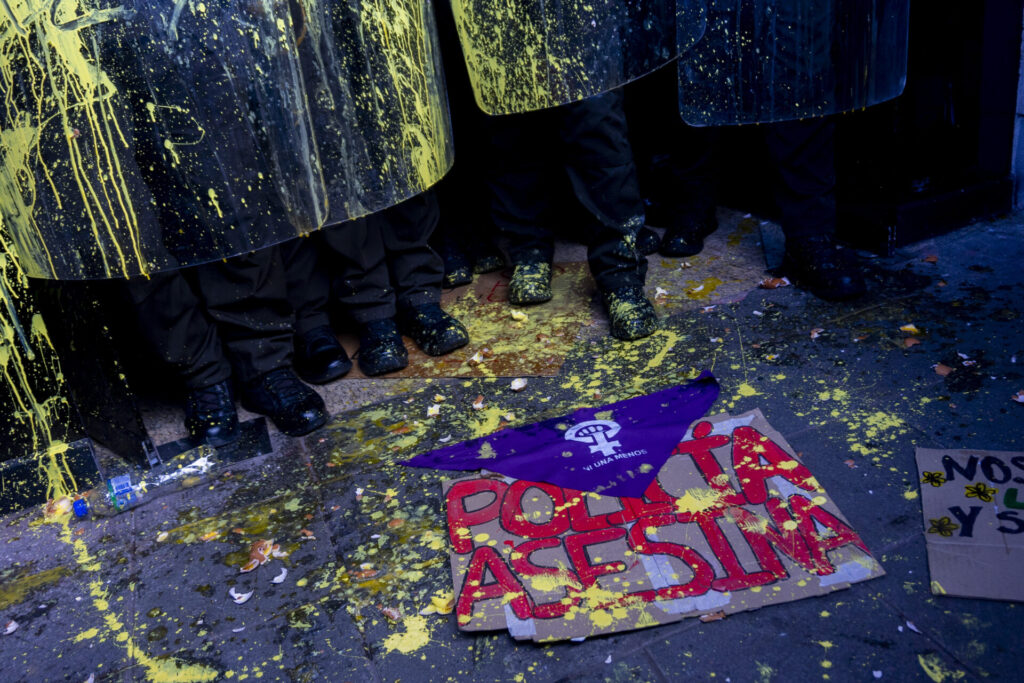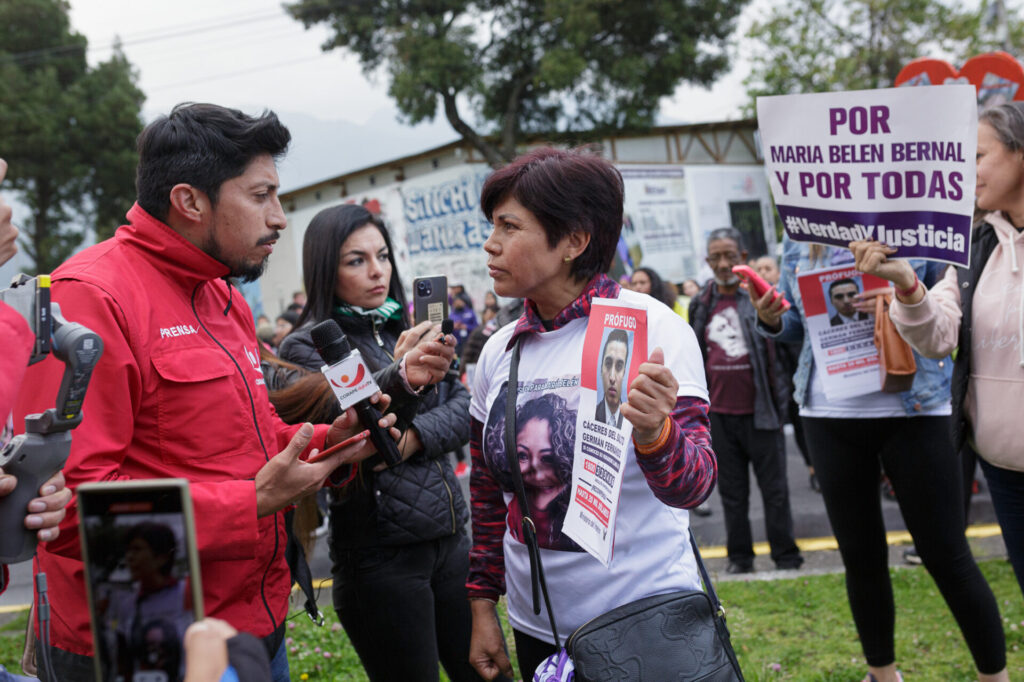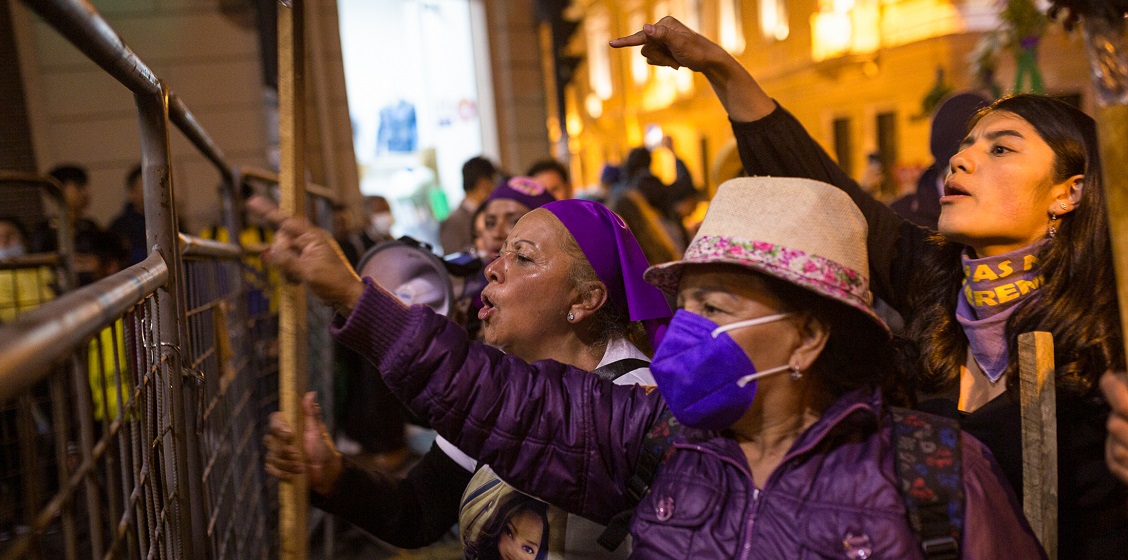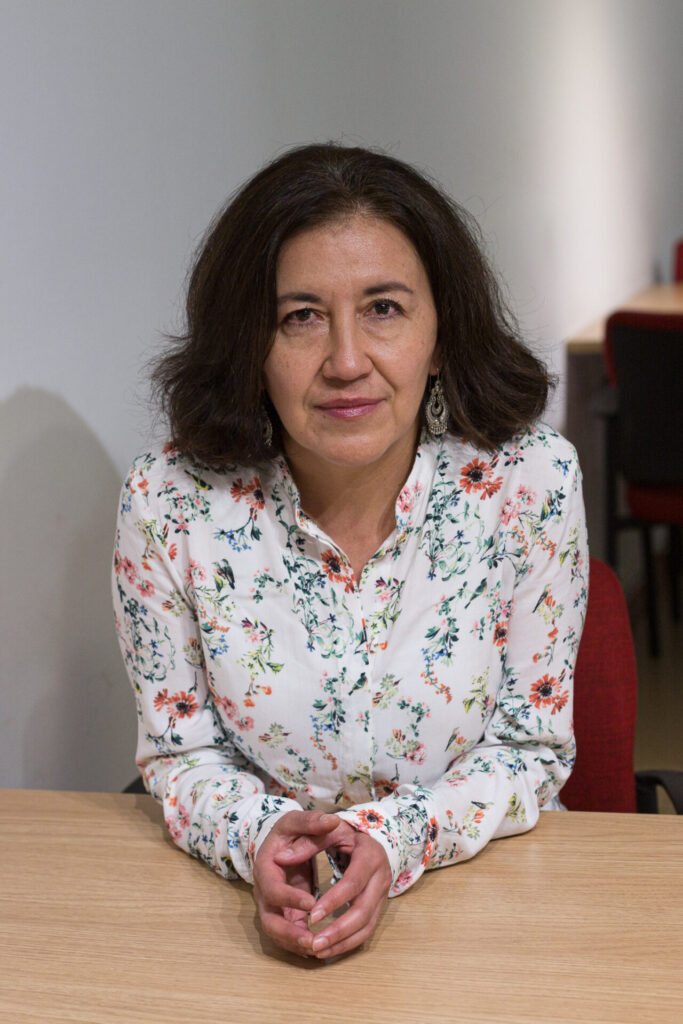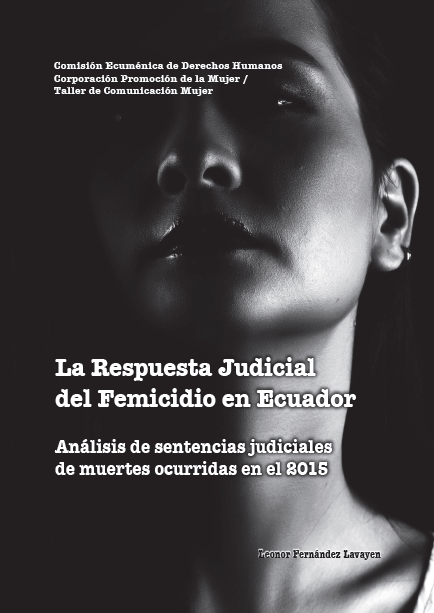Every 28 hours a woman is killed in Ecuador, for the simple reason of being a woman in this patriarchal system we live in. So-called femicide. But in 2022, one particular femicide has shocked the country and brought hundreds of people out to protest in the streets. The murder of the lawyer Maria Belen Bernal on the 11th of September, at the police school in the country’s capital Quito. Her husband German Caseres, a police officer and teacher at the school is the main suspect and he is still missing to this date.
”The case of María Belén Bernal has become an aberration. A woman dies at the hands of her husband who is a policeman, within a police facility, when it is the police who have the legal duty to protect people from being killed. So this is what provokes an accumulation of indignation. The feeling that there is no more protection, that if a woman is killed in the police force, there is nowhere else to turn, then what can we expect? But the most serious thing is all this behavior to cover up,” says Susy Garbay, a feminist lawyer and professor at the public Central University in Ecuador.
The cover-up, that the lawyer is referring to, has been questioned from many sides. How are the police supposed to investigate a crime amongst themselves? Just after Maria Belen went missing, her husband was interviewed by colleagues but released afterwards. Also, the main suspect didn’t allow the police investigators to enter his room to make the investigation. Soon after, he went missing, supposedly leaving the country. Did someone from within the police institution help him to escape?
Maria Belen’s body was found ten days after her murder. Also the circumstances around the findings of the body, the search, and the many days it took to locate it has been questioned by women’s organizations, the family, and the lawyers of the victim.
The case of Maria Belen has gotten a lot of attention, because of the involvement of the police school and institution. But unfortunately, she is just one out of many victims of femicide in Ecuador and in Latin America. 332 girls and women have been killed in Ecuador in 2022 according to the ALDEA Foundation.
Maria Belen died at 34 years old and left behind a 13-year-old son. The aggravating circumstances made it a cause many Ecuadorians claimed and were indignant about.
During the months that have passed since the death of Maria Belen in September, there have been several demonstrations in Quito and elsewhere in the country. ”Señor, señora, no sean indiferentes. Nos matan y nos violan en la cara de la gente” – would the mass yell, at one of those events in the streets of Quito, meaning: ”Sir, madam, don’t be indifferent. We are being killed and raped in people’s faces.
Obviously, the loss and the whole case is really hard on Maria Belen’s mother, Elizabeth Otavalo: ”She was a fighter, a woman full of love with clear visions and objectives, and with ambitions and an appetite for life, a will to live and it was all taken away from her. ”She would have done the same thing I am doing for her; to fight for the truth,” says Elizabeth from the leather couch in what used to be her daughter’s lawyer’s office in Quito.
Let’s have a look at the relatively recent incorporation of the concept of femicide in Ecuadorian legislation. Femicide in Ecuador was only criminalized in 2014.
”But there have always been deaths of women, it’s like a patriarchal policy. So, in fact, the death of women has been covered up by the law itself until the late 1980s, there were even penal figures that exempted the men from the house when they punished women even to death, that is, for example, an adulterous woman who was found with her lover, so to speak, could die at the hands of her husband and the husband had no criminal sanction. This was the case until 1983, and until 1989 there was even another criminal law in force, which said that the father, brother, or grandfather could also kill a daughter, granddaughter, or sister who was found to be carnal and legitimate, there was even legal permission to kill women. These norms that protected impunity in the face of the death of women were declared unconstitutional in the ’80s and ’90s with the debate of the human rights discourses, women’s organizations also demanding greater rights, but obviously, the cultural element of that symbolic universe that was in these norms has not been overcome, for example, the sense of ownership of the man over the woman’s body has not been modified,” says Susy.
”In Ecuador, there was not much interest, let’s say, there was no record of the cases of women’s deaths. Femicides were all prosecuted under the figure of homicide-murder and it was not really possible to show the register of women killed by their partners or in these contexts of power relations,” says Susy.
It is not until 2011, that the first study is made in Ecuador about femicide – women murdered because of their sex. The study was done by an Ecuadorian and Costa Rican lawyer. Femicide is in the actual Ecuadorian legislation described as, when a person who, as a result of power relations manifested in any type of violence, kills a woman because she is a woman or because of her gender. But that doesn’t mean that all gender-based killings of women are registered as so.
”That is the formal dimension of law, but there is more to it. Law has to be seen as a much more complex phenomenon, it is a legal phenomenon that has not only a formal dimension, It has a cultural dimension, it has a structural dimension, so the interpretation made by the justice operators who have the possibility of raising the legal discourse in concrete cases has distorted the penal type. In several cases they do not understand this when they naturalize, for example, instead of placing an act in the pedagogical type of femicide they place it in the penal type of homicide, that is to say without putting into evidence these power relations that characterize femicide.
Another newer (2015 ) study from Ecuador made by the Ecumenical Commission on Human Rights shows how there is too much attention paid to the victim’s behavior, to what the victim did to provoke the death.
Now, let us go back to the recent events in Ecuador. How could femicide happen inside a police school? Several circumstances afterward have risen criticism internationally, for instance from The Inter-American Commission of Human Rights: ”In light of the disappearance and femicide of Maria Belén Bernal in Quito, IACHR urges the State to investigate with enhanced due diligence; to prosecute and punish those responsible; to combat tolerance of gender-based violence in the country.”
The commission wrote in a statement that was sent out shortly after her body was found: ”Given the context of violence against women in the country, the State must prioritize the adoption of prevention measures that address the structural causes, guarantee access to justice with a gender perspective and comprehensive reparation for victims and their families.”
The UN has also commented on the case: ”The United Nations System in Ecuador deeply regrets the femicide of María Belén Bernal. The events that allegedly took place within a police institution need to be investigated in an expeditious and independent manner and punished in accordance with the Constitution and the law. The rights of the victims must also be comprehensively redressed, including measures of non-repetition. This femicide is part of a serious situation of violence against women,” said part of the statement.
Maria Belen’s mother is really disappointed with how the Government and the police have been handling the whole case: ”On the part of the government, there has never been any institutional support. The only thing they wanted to do is to look after the image of the institutions, but not to respond to the basic issue, which is how she could get murdered inside a higher education institution, a police academy, where people are supposed to be trained to provide security for us people. And now come these slow and tedious legal processes of searching, which is even more painful, because I will always have to re-victimize myself, and remembering is hard,” says Elizabeth Otavalo.
And the case has already had high political costs – for instance when president Guillermo Lasso dismissed the Minister of the interior, Carillo. Also, the head of the police Academy was replaced, and 12 police officers were suspended.
On the other hand, on the 29th of November 2022, Lasso made the symbolic name-change of the Human Rights Secretary to The Ministry of Women and Human Rights appointing Paola Flores as the new Minister.
But it is important not to forget the State’s responsibility in the case, Elizabeth Otavalo’s lawyer, Jesús Alberto López points out: ”Let’s not forget that we also have State responsibility here because the State is responsible for the actions committed by its officials in the exercise of their duties. Here Germán Cáceres was an official of the State National Police and was on duty, therefore there exists State responsibility as established in the Constitution of Ecuador and also within the scope of justice. The Ecuadorian State will have to compensate for the rights of María Belén Bernal, especially her son she left behind who is only 13 years old,” says the lawyer.
On one of the last days of the year Germán Cáceres was arrested in the Colombian town Palomino and on the 3rd of January he was extradited to Ecuador and transferred to the maximum security prison in the city of Guayaquil. Days after he was transferred to Quito to take part in expert examinations and on the 12th of January, he confessed to having killed his wife Maria Belen Bernal.
Lise Josefsen Hermann – a freelance journalist based in Latin America for more than a decade. She is a Pulitzer Grantee, works for the investigative media Danwatch and has published in media like Al Jazeera, BBC, Deutsche Welle, Danish Broadcasting Corporation, El Pais, New York Times, and Undark Magazine. Photos: Verónica Almeida & Andrés Yépez
